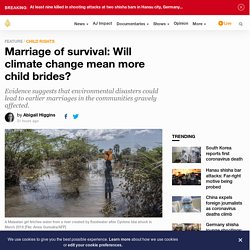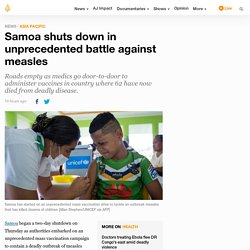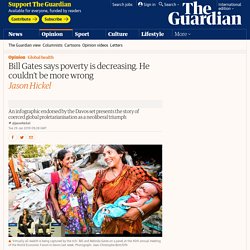

Marriage of survival: Will climate change mean more child brides? After Cyclone Idai battered southern Malawi last year, the hotline Weston Msowoya manages was flooded with calls.

They were reporting cases of young girls being married off in the tented camps hastily established by the United Nations Refugee Agency and other aid groups to house some 94,000 people displaced by one of the deadliest storms to ever hit the southern hemisphere. By the time it had subsided, more than 1,000 people in three countries were dead. Some 1.85 million people needed support in Mozambique alone - from housing to food to healthcare, particularly in the port city of Beira, a staggering 90 percent of which had been destroyed.
In Malawi, Msowoya was watching another tragedy unfold: he recorded 74 child marriages just in the camps he was able to reach (others were blocked because swathes of the country were under water). "It's heartbreaking. One in five Women in Mozambique walk past flattened crops in the aftermath of Cyclone Idai [File: Reuters] How can we reduce our daily waste? By IMFBlog Have you thought about how much garbage you generate every day?

Economists have looked at the data and it turns out that higher-income countries like the United States, Denmark, and New Zealand generate at least twice as much waste per capita than developing countries. Our chart of the week from recent research shows which advanced economies generate just how much waste per person. Higher-income people not only consume more goods overall, but they also use up a higher concentration of packaged and complex durable goods like cars, appliances, and electronic equipment. Also, most waste in middle- and high-income countries consists of inorganic materials, notably paper and plastic.
While high-income countries generate more waste per capita, in terms of aggregate volume, developing countries produce more than half of total solid waste. Many of the world’s highest waste generation rates per person are found in developing island nations, where tourism plays a large role. Why Are Poor Countries Poor? Samoa shuts down in unprecedented battle against measles. Samoa began a two-day shutdown on Thursday as authorities embarked on an unprecedented mass vaccination campaign to contain a deadly outbreak of measles that has killed 62 people, mostly small children, in the Pacific island nation.

Officials suspended non-essential government services to allow civil servants to support the vaccination drive, and ordered all businesses to close. Inter-island ferry services were also cancelled. More: Families hit by measles told to raise red flagsSamoa makes measles vaccine mandatoryMeasles cases triple around the world, WHO warns Residents were advised to stay in their homes and display a red flag if they were not yet immunised as vaccination teams went to work across the nation of 200,000 in the early hours of the morning. "No one is being permitted to drive unless they are going to hospital or they have special permission," Al Jazeera's Jessica Washington said from the capital, Apia.
"That's what we're doing right now. SOURCE: Al Jazeera and news agencies. Borders. Governments draw borders. Governments manage borders. But humans live inside them. From the North Pole to the northern shore of Africa to the Himalayas of Nepal, the lines we’ve used to apportion the planet play a decisive role in the past, present, and future of billions. Every border has a different origin story and a different character. Borders can encourage exchange or instigate violence. I’m Johnny Harris, a journalist at Vox. If you want to know a country’s deepest fears, look at its border. Bill Gates says poverty is decreasing. He couldn’t be more wrong. Last week, as world leaders and business elites arrived in Davos for the World Economic Forum, Bill Gates tweeted an infographic to his 46 million followers showing that the world has been getting better and better.

“This is one of my favourite infographics,” he wrote. “A lot of people underestimate just how much life has improved over the past two centuries.” Of the six graphs – developed by Max Roser of Our World in Data – the first has attracted the most attention by far. Why the Guardian is changing the language it uses about the environment. The Guardian has updated its style guide to introduce terms that more accurately describe the environmental crises facing the world.

Instead of “climate change” the preferred terms are “climate emergency, crisis or breakdown” and “global heating” is favoured over “global warming”, although the original terms are not banned. “We want to ensure that we are being scientifically precise, while also communicating clearly with readers on this very important issue,” said the editor-in-chief, Katharine Viner. “The phrase ‘climate change’, for example, sounds rather passive and gentle when what scientists are talking about is a catastrophe for humanity.” “Increasingly, climate scientists and organisations from the UN to the Met Office are changing their terminology, and using stronger language to describe the situation we’re in,” she said.
The United Nations secretary general, António Guterres, talked of the “climate crisis” in September, adding: “We face a direct existential threat.”